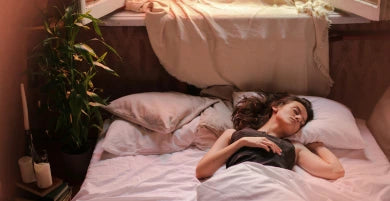If you find yourself hitting snooze more than usual before or during your period, you're not alone. Feeling low on energy or experiencing fatigue before your period is a common concern among menstruators. While it might feel like you're just being lazy or off your routine, this deep need for sleep is often your body’s way of signalling something bigger; namely, the intense hormonal activity that takes place during your menstrual cycle.
Understanding the science behind why periods may make you sleep more can help you feel less frustrated and more empowered to support your body through the ups and downs.
What Is Period Fatigue?
Fatigue before period refers to a recurring drop in energy levels that happens before or during menstruation. It can feel like you’re dragging through your day, unable to stay alert, or even needing more naps or nighttime sleep than usual.
This tiredness is not just in your head—it’s a real physiological experience tied to your hormonal cycle. When your hormones shift rapidly during the luteal phase, it can affect everything from your sleep cycle to your motivation.
Symptoms Of Period-Related Fatigue
Period fatigue can vary in intensity, but some common signs include:
- Trouble waking up or staying awake during the day
- Brain fog or difficulty concentrating Increased irritability or moodiness
- A greater desire to nap or sleep longer hours
- Feeling extremely tired during periods, even with adequate rest
- Loss of motivation or interest in daily tasks
If these symptoms occur consistently in the days before your period, it's likely linked to fatigue before your period and not just regular tiredness.
Causes Of Fatigue Before Period
The root of fatigue before period lies in the hormonal shifts of your menstrual cycle. Two key players are estrogen and the progesterone hormone.
- After ovulation, progesterone hormone levels rise. This hormone can have a calming, even sedating effect on the brain, which may increase the need for rest and sleep.
- As progesterone drops just before your period, it can lead to mood swings, insomnia, and period tiredness.
- Simultaneously, there’s often a dip in serotonin hormone, the brain chemical associated with happiness and alertness. This can contribute to feelings of emotional and physical exhaustion.
- These rapid hormonal swings often lead to hormonal imbalance, which further drains your energy and impacts sleep quality.
On top of these hormonal shifts, other culprits can intensify period fatigue:
- Low iron levels due to menstrual blood loss
- Poor sleep from cramps, bloating, or anxiety
- Blood sugar fluctuations driven by cravings or diet changes
- Dehydration or lack of physical activity
Together, these factors can create the perfect storm for feeling extremely tired during your period.
How To Deal With Period Fatigue
Addressing fatigue before period involves both short-term support and longer-term hormonal balance strategies. Here are some effective options:
- Go to bed and wake up at consistent times. Use blackout curtains, limit screen time, and wind down with calming rituals.
- Balance complex carbs with protein and healthy fats. Foods rich in magnesium, iron, and B vitamins can ease period tiredness and support neurotransmitter production.
- Dehydration can amplify fatigue, so aim for at least 2–3 litres of water daily, especially during your cycle.
- While you may not feel like working out, light movement like stretching, yoga, or walking can boost circulation and regulate energy.
- If your symptoms are severe, recurring, or interfering with daily life, test for anaemia, thyroid issues, or hormonal imbalance.
Prevention And Boosting Happy Hormones During Your Period
To reduce fatigue before period over time, focus on lifestyle changes that help your body regulate hormones better. This includes:
- Chronic stress disrupts the balance of cortisol and other hormones, worsening progesterone hormone dips and serotonin hormone drops. Incorporate stress-reducing habits like journaling, meditation, or creative hobbies.
- Movement increases serotonin hormone levels and improves sleep quality over time. Aim for 20–30 minutes of low-to-moderate exercise most days.
- Keep a log of your sleep patterns through your cycle to identify trends. If needed, use supplements like magnesium or consult your doctor about melatonin support.
- Reduce processed foods and refined sugar. Opt for hormone-friendly options like leafy greens, seeds, fatty fish, and whole grains to support energy and reduce hormonal imbalance.
When your happy hormones are in sync, your mood lifts, period fatigue fades, and energy flows more evenly through your cycle.
Honour Your Cycle, Honour Your Rest
Yes, your period can make you sleep more and that doesn’t mean you’re lazy or overreacting. It means your body is shifting gears, balancing hormones, and asking for recovery time. Instead of pushing through, try mindfully tuning in. Track your symptoms and see when your energy dips, notice patterns, and adjust your habits gently around them. Whether it’s turning in earlier, adjusting your nutrition, or carving out space to slow down, know this: listening to your cycle isn’t indulgent. It’s intelligent. Let your body lead and give it the rest it needs.


























































